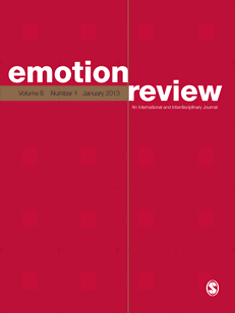
Emotion Review
Scope & Guideline
Unveiling the Science Behind Feelings
Introduction
Aims and Scopes
- Interdisciplinary Approach to Emotions:
The journal embraces an interdisciplinary perspective, integrating insights from psychology, neuroscience, sociology, literature, and environmental studies to provide a holistic understanding of emotions. - Empirical Research and Theoretical Development:
It publishes empirical studies that contribute to the theoretical frameworks of emotion, emphasizing both qualitative and quantitative methodologies to deepen insights into emotional phenomena. - Cultural and Contextual Variability:
Research published in the journal often addresses how emotions are experienced and expressed differently across cultures and contexts, highlighting the importance of situational factors. - Applied Emotion Science:
The journal also focuses on practical applications of emotion research, such as interventions for emotional well-being, emotional education, and implications for public policy, particularly in areas like climate change. - Historical and Philosophical Perspectives:
In addition to contemporary studies, 'Emotion Review' also explores historical and philosophical dimensions of emotions, offering a reflective lens on how emotions have been understood throughout history.
Trending and Emerging
- Affective Responses to Climate Change:
There is a growing emphasis on how emotions influence responses to climate change, reflecting an urgent need to understand emotional drivers in environmental decision-making and action. - Emotions in Literature and Arts:
Recent articles have increasingly examined the interplay between emotions and narrative forms in literature and arts, suggesting an emerging trend of analyzing how creative expressions shape and reflect emotional experiences. - Dynamic Emotion Regulation:
Research focusing on the dynamic and context-sensitive nature of emotion regulation is trending, moving away from static models to explore how emotions are managed in real-time situations. - Empathy and Social Connection:
There is a notable increase in studies related to empathy, particularly in the context of social relationships and cultural understanding, indicating its importance in bridging emotional experiences across diverse groups. - Neuroscientific Perspectives on Emotion:
Emerging themes include the integration of neuroscientific insights into emotional processes, indicating a trend towards understanding the biological underpinnings of emotions and their implications for behavior.
Declining or Waning
- Traditional Theories of Emotion:
There seems to be a waning interest in strictly traditional theories of emotion that do not integrate contemporary findings from neuroscience and social psychology, as newer research favors more dynamic and contextual approaches. - Narrowly Defined Emotion Taxonomies:
The focus on rigid emotion taxonomies has decreased, with more emphasis now on nuanced, context-driven understandings of emotional experiences rather than fixed categories. - Disciplinary Isolation:
Research that remains within the confines of a single discipline without interdisciplinary connections is less frequently published, reflecting a broader trend towards integrative approaches. - Static Models of Emotion Regulation:
There is a declining focus on static models of emotion regulation, as recent studies emphasize the dynamic and situational aspects of how emotions are regulated over time. - Historical Overviews Without Contemporary Relevance:
Papers that provide historical overviews of emotional theories without linking them to current research or applications seem to be less prevalent, suggesting a demand for relevance in contemporary discussions.
Similar Journals
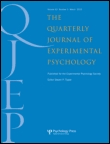
QUARTERLY JOURNAL OF EXPERIMENTAL PSYCHOLOGY
Exploring the Depths of Human CognitionQuarterly Journal of Experimental Psychology, published by SAGE Publications Ltd, is a leading peer-reviewed journal that serves as a vital resource in the fields of experimental and cognitive psychology, neuropsychology, and medicine. With an impactful contribution to psychological research, the journal is recognized for its rigorous methodology and empirical studies, holding a notable ranking among its peers—finding itself in the Q2 quartile across several categories. With its origin tracing back to 2006, Quarterly Journal of Experimental Psychology significantly influences the academic discourse until its latest published findings in 2024. Catering to a diverse audience of researchers, professionals, and students, this journal provides Open Access options, enhancing the reach and accessibility of cutting-edge psychological research. By focusing on innovative approaches and findings, it aims to bridge theoretical understanding with practical application, hence fostering advancement in multiple related disciplines. For those committed to understanding the complexities of human behavior and cognitive processes, this journal remains an essential reference point.

International Journal of Neural Systems
Fostering Collaboration in the Evolving Field of Neural ResearchThe International Journal of Neural Systems, published by World Scientific Publishing Co Pte Ltd, is a prestigious peer-reviewed journal dedicated to the dynamic field of neural systems research. With an ISSN of 0129-0657 and an E-ISSN of 1793-6462, this journal serves as a vital resource for researchers, professionals, and students interested in the intersections of computer science, neural networks, and communications. Noteworthy for its impact, the journal has achieved impressive rankings in 2023, positioned in the Q1 quartile for both Computer Networks and Communications as well as in the miscellaneous category of Medicine, highlighting its interdisciplinary significance and broad relevance. The journal's Scopus rank places it at #33 out of 395 in its category, reflecting its influence and reach within the academic community. While the journal is not open access, its contributions to advancing the understanding of neural systems are invaluable, offering a platform for disseminating cutting-edge research and fostering collaboration among scholars. Since its inception, the International Journal of Neural Systems remains committed to excellence and innovation in its published content, making it an essential subscription for everyone involved in this exciting and rapidly evolving field.
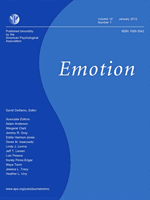
EMOTION
Unraveling the Dynamics of FeelingsEMOTION is a leading peer-reviewed journal published by the American Psychological Association, focusing on the intricate dynamics of human emotions. With its ISSN 1528-3542 and E-ISSN 1931-1516, this esteemed journal has established itself as a pivotal resource in the fields of Psychology and Medicine, proudly ranking in the top quartile (Q1) according to the latest metrics and scoring a remarkable position as #22 out of 216 in the Scopus General Psychology category, placing it in the 90th percentile of its field as of 2023. Spanning from its inception in 2001 to 2024, EMOTION publishes cutting-edge research, theoretical articles, and empirical studies that advance our understanding of emotional processes and their implications for psychological well-being. While EMOTION is not an open-access journal, it remains a crucial platform for researchers, professionals, and students seeking to engage with and contribute to the burgeoning field of emotional psychology.
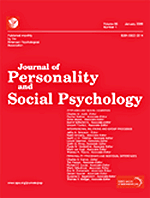
JOURNAL OF PERSONALITY AND SOCIAL PSYCHOLOGY
Advancing Insights into Personality DynamicsJournal of Personality and Social Psychology, published by the American Psychological Association, stands as a premier resource in the fields of social psychology and sociology, offering critical insights into the dynamics of human behavior and interpersonal relationships. With an impressive impact factor and ranked in the top tier of academic journals—Q1 in both Social Psychology and Sociology & Political Science—it consistently attracts high-caliber research submissions that advance theoretical and practical knowledge. Established in 1965, this journal has become a cornerstone for scholars and practitioners alike, facilitating the dissemination of pivotal studies in understanding social influences and individual personalities. As a key player in its field, it is essential reading for anyone involved in psychological research, providing a platform for innovative ideas and comprehensive analyses. Despite its subscription-only access model, its influence is reinforced by its consistently high rankings on Scopus, underscoring its significance by being in the 98th percentile for sociology and the 97th percentile for social psychology. Academics looking to delve into transformative concepts around personality and social interactions will find Journal of Personality and Social Psychology an invaluable addition to their resources.

JOURNAL OF PSYCHOPHYSIOLOGY
Illuminating the Links Between Mind and BodyJOURNAL OF PSYCHOPHYSIOLOGY, published by Hogrefe Publishing Corp, serves as a crucial platform for the dissemination of research in the interdisciplinary fields of neuropsychology, physiological psychology, and neuroscience. With an ISSN of 0269-8803 and an E-ISSN of 2151-2124, this journal has been a staple in the academic community since its inception in 1987 and will continue to publish impactful research until at least 2024. Despite the absence of Open Access, the journal maintains a significant presence, holding Q3 and Q4 quartile rankings in relevant disciplines according to the 2023 metrics. Researchers and practitioners benefit from the journal's robust focus on integrating psychophysiological research with practical applications, contributing to a better understanding of psychological processes through physiological insights. As evident from its Scopus rankings, the JOURNAL OF PSYCHOPHYSIOLOGY is dedicated to fostering scholarly dialogue and advancing knowledge in the field, making it an essential resource for anyone invested in the intricacies of human behavior and the physiological underpinnings thereof.

BRITISH JOURNAL OF PSYCHOLOGY
Connecting Theory and Practice in Psychology.The British Journal of Psychology, published by Wiley, stands as a premier outlet in the field of psychology, reflecting its significant contributions to the discipline since its inception in 1953. Renowned for its rigorous peer-review process, the journal holds a prestigious Q1 ranking in the field of psychology and is positioned in the top 88th percentile among general psychology publications according to Scopus rankings. With an ISSN of 0007-1269 and E-ISSN 2044-8295, the journal provides a platform for cutting-edge research that spans a diverse range of psychological topics. Although it currently does not offer Open Access options, it continues to be an essential resource for researchers, professionals, and students eager to advance their understanding of psychological theories and practices. The journal's commitment to fostering academic discourse makes it indispensable for those looking to stay at the forefront of psychological research and application.

Linguistic Research
Exploring the Dynamics of Language and CommunicationLinguistic Research, published by the Kyung Hee University Institute for Study of Language & Information, stands as a prominent platform within the field of linguistics and language studies. With an ISSN of 1229-1374, this journal has gained recognition for its contributions to theoretical and empirical research since its inception in 2014. Ranked in the Q2 category of linguistics and language in 2023, it has established its presence in prestigious databases like Scopus, where it ranks #404 in Arts and Humanities and #479 in Social Sciences. The journal actively encourages scholarly discussion and innovation, providing a crucial venue for researchers, professionals, and students to disseminate their findings and engage in the evolving conversation around language. Despite not being open access, Linguistic Research is pivotal for those seeking comprehensive insights and advancements in linguistic studies, making it an essential resource for anyone passionate about the dynamics of language and communication.
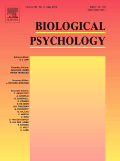
BIOLOGICAL PSYCHOLOGY
Charting New Territories in Neuropsychological ResearchBIOLOGICAL PSYCHOLOGY is a prominent academic journal published by Elsevier, recognized for its critical contributions to the fields of neuropsychology and physiological psychology. With a steadfast publication history since 1973, it has established itself as a vital resource for researchers, professionals, and students interested in the intricate connections between biological processes and psychological phenomena. As evidenced by its esteemed 2023 Q1 ranking in Neuropsychology and Physiological Psychology and Q2 in Neuroscience (miscellaneous), this journal occupies a prestigious position in the academic community, fostering innovative research and scholarly discourse. The journal offers a rigorous platform for the publication of empirical studies, theoretical articles, and reviews that illuminate the relationship between brain function and behavior. Although Open Access options are not available, readers can benefit from robust subscription access to its cutting-edge content. With an increasing focus on interdisciplinary approaches, BIOLOGICAL PSYCHOLOGY aims to advance understanding in a rapidly evolving field, making it an essential reference for those at the forefront of psychological and neuroscientific research.

Evolutionary Psychology
Advancing Understanding of Mind and EvolutionEvolutionary Psychology is a crucial journal published by SAGE Publications Inc, dedicated to exploring the intersection of psychological sciences and evolutionary theory. Established as an Open Access platform since 2003, this journal aims to facilitate the dissemination of groundbreaking research that examines how evolutionary processes shape human behavior and cognitive functions. With a range of articles that cater to various aspects of psychology, especially in fields such as Behavioral Neuroscience, Social Psychology, and general Medicine, the journal holds significant relevance in contemporary academic discourse. Although it currently resides in the lower quartiles (Q4 and Q3) in its respective categories, it provides a vital space for innovative ideas and perspectives, inviting researchers and students to contribute and engage with the rapidly evolving understanding of human psychology through an evolutionary lens. The journal is indexed with an ISSN of 1474-7049, ensuring broad accessibility and outreach to a global audience.
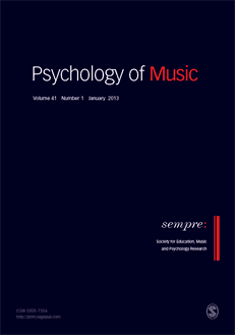
Psychology of Music
Fostering Connections Through Music and MindPsychology of Music is a prominent academic journal published by SAGE Publications Inc, focusing on the interdisciplinary field that bridges psychological principles and musical expression. Established in 1973, this esteemed journal plays a crucial role in advancing understanding of how music affects emotions, cognition, and social interactions, thus catering to a diverse audience of researchers, educators, and practitioners in both psychology and music. With an impressive impact factor that places it in the Q1 category for Music and Q2 for Psychology (miscellaneous) in 2023, this journal ranks 3rd out of 180 in Arts and Humanities – Music, and 19th out of 97 in Psychology (miscellaneous) according to Scopus metrics, affirming its authoritative contribution to the field. The Psychology of Music is essential for those looking to explore cutting-edge research, methodologies, and applications, providing rich insights and fostering discussions that reach into music therapy, education, and psychological wellness. Although it is not an open-access journal, its high-quality peer-reviewed articles are pivotal for anyone dedicated to the intricate relationship between music and the mind, making it a must-read for professionals and students alike.